Sabriel Read online
Page 2
Sabriel’s father had chosen it for that reason when he had emerged from the Old Kingdom with a five-year-old girl in tow to seek a boarding school. He had paid in advance for that first year, in Old Kingdom silver deniers that stood up to surreptitious touches with cold iron. Thereafter, he had come to visit his daughter twice a year, at Midsummer and Midwinter, staying for several days on each occasion and always bringing more silver.
Understandably, the Headmistress was very fond of Sabriel. Particularly since she never seemed troubled by her father’s rare visitations, as most other girls would be. Once Mrs. Umbrade had asked Sabriel if she minded, and had been troubled by the answer that Sabriel saw her father far more often than when he was actually there. Mrs. Umbrade didn’t teach Magic, and didn’t want to know any more about it other than the pleasant fact that some parents would pay considerable sums to have their daughters schooled in the basics of sorcery and enchantment.
Mrs. Umbrade certainly didn’t want to know how Sabriel saw her father. Sabriel, on the other hand, always looked forward to his unofficial visits and watched the moon, tracing its movements from the leather-bound almanac which listed the phases of the moon in both Kingdoms and gave valuable insights into the seasons, tides and other ephemerae that were never the same at any one time on both sides of the Wall. Abhorsen’s sending of himself always appeared at the dark of the moon.
On these nights, Sabriel would lock herself into her study (a privilege of the Sixth Form—previously she’d had to sneak into the library), put the kettle on the fire, drink tea and read a book until the characteristic wind rose up, extinguished the fire, put out the electric light and rattled the shutters—all necessary preparations, it seemed, for her father’s phosphorescent sending to appear in the spare armchair.
Sabriel was particularly looking forward to her father’s visit that November. It would be his last, because college was about to end and she wanted to discuss her future. Mrs. Umbrade wanted her to go to university, but that meant moving further away from the Old Kingdom. Her magic would wane and parental visitations would be limited to actual physical appearances, and those might well become even less frequent. On the other hand, going to university would mean staying with some of the friends she’d had virtually all her life, girls she’d started school with at the age of five. There would also be a much greater world of social interaction, particularly with young men, of which commodity there was a distinct shortage around Wyverley College.
And the disadvantage of losing her magic could possibly be offset by a lessening of her affinity for death and the dead . . .
Sabriel was thinking of this as she waited, book in hand, half-drunk cup of tea balanced precariously on the arm of her chair. It was almost midnight and Abhorsen hadn’t appeared. Sabriel had checked the almanac twice and had even opened the shutters to peer out through the glass at the sky. It was definitely the dark of the moon, but there was no sign of him. It was the first time in her life that he hadn’t appeared and she felt suddenly uneasy.
Sabriel rarely thought about what life was really like in the Old Kingdom, but now old stories came to mind and dim memories of when she’d lived there with the Travelers. Abhorsen was a powerful sorcerer, but even then . . .
“Sabriel! Sabriel!”
A high-pitched voice interrupted her thought, quickly followed by a hasty knock and a rattle of the doorknob. Sabriel sighed, pushed herself out of her chair, caught the teacup and unlocked the door.
A young girl stood on the other side, twisting her nightcap from side to side in trembling hands, her face white with fear.
“Olwyn!” exclaimed Sabriel. “What is it? Is Sussen sick again?”
“No,” sobbed the girl. “I heard noises behind the tower door, and I thought it was Rebece and Ila having a midnight feast without me, so I looked . . .”
“What!” exclaimed Sabriel, alarmed. No one opened outside doors in the middle of the night, not this close to the Old Kingdom.
“I’m sorry,” cried Olwyn. “I didn’t mean to. I don’t know why I did. It wasn’t Rebece and Ila—it was a black shape and it tried to get in. I slammed the door . . .”
Sabriel threw the teacup aside and pushed past Olwyn. She was already halfway down the corridor before she heard the porcelain smash behind her, and Olwyn’s horrified gasp at such cavalier treatment of good china. She ignored it and broke into a run, slapping on the light switches as she ran towards the open door of the west dormitory. As she reached it, screams broke out inside, rapidly crescendoing to an hysterical chorus. There were forty girls in the dormitory—most of the First Form, all under the age of eleven. Sabriel took a deep breath, and stepped into the doorway, fingers crooked in a spell-casting stance. Even before she looked, she felt the presence of death.
The dormitory was very long, and narrow, with a low roof and small windows. Beds and dressers lined each side. At the far end, a door led to the West Tower steps. It was supposed to be locked inside and out, but locks rarely prevailed against the powers of the Old Kingdom.
The door was open. An intensely dark shape stood there, as if someone had cut a man-shaped figure out of the night, carefully choosing a piece devoid of stars. It had no features at all, but the head quested from side to side, as if whatever senses it did possess worked in a narrow range. Curiously, it carried an absolutely mundane sack in one four-fingered hand, the rough-woven cloth in stark contrast to its own surreal flesh.
Sabriel’s hands moved in a complicated gesture, drawing the symbols of the Charter that intimated sleep, quiet and rest. With a flourish, she indicated both sides of the dormitory and drew one of the master symbols, drawing all together. Instantly, every girl in the room stopped screaming and slowly subsided back onto her bed.
The creature’s head stopped moving and Sabriel knew its attention was now centered on her. Slowly it moved, lifting one clumsy leg and swinging it forward, resting for a moment, then swinging the other a little past the first. A lumbering, rolling motion, that made an eerie, shuffling noise on the thin carpet. As it passed each bed, the electric lights above them flared once and went out.
Sabriel let her hands fall to her side and focused her eyes on the center of the creature’s torso, feeling the stuff of which it was made. She had come without any of her instruments or tools, but that led to only a moment’s hesitation before she let herself slip over the border into Death, her eyes still on the intruder.
The river flowed around her legs, cold as always. The light, grey and without warmth, still stretched to an entirely flat horizon. In the distance, she could hear the roar of the First Gate. She could see the creature’s true shape clearly now, not wrapped in the aura of death which it carried to the living world. It was an Old Kingdom denizen, vaguely humanoid, but more like an ape than a man and obviously only semi-intelligent. But there was more to it than that, and Sabriel felt the clutch of fear as she saw the black thread that came from the creature’s back and ran into the river. Somewhere, beyond the First Gate, or even further, that umbilical rested in the hands of an Adept. As long as the thread existed the creature would be totally under the control of its master, who could use its senses and spirit as it saw fit.
Something tugged at Sabriel’s physical body, and she reluctantly twitched her senses back to the living world, a slight feeling of nausea rising in her as a wave of warmth rushed over her death-chilled body.
“What is it?” said a calm voice, close to Sabriel’s ear. An old voice, tinged with the power of Charter Magic—Miss Greenwood, the Magistrix of the school.
“It’s a Dead servant—a spirit form,” replied Sabriel, her attention back on the creature. It was halfway down the dorm, still single-mindedly rolling one leg after the other. “Without free will. Something sent it back to the living world. It’s controlled from beyond the First Gate.”
“Why is it here?” asked the Magistrix. Her voice sounded calm, but Sabriel felt the Charter symbols gathering in her voice, forming on her tongue—symbols that would un
leash lightning and flame, the destructive powers of the earth.
“It’s not obviously malign, nor has it attempted any actual harm . . .” replied Sabriel slowly, her mind working over the possibilities. She was used to explaining purely necromantic aspects of magic to Miss Greenwood. The Magistrix had taught her Charter Magic, but necromancy was definitely not on the syllabus. Sabriel had learned more than she wanted to know about necromancy from her father . . . and the Dead themselves. “Don’t do anything for a moment. I will attempt to speak with it.”
The cold washed over her again, biting into her, as the river gushed around her legs, eager to pull her over and carry her away. Sabriel exerted her will, and the cold became simply a sensation, without danger, the current merely a pleasing vibration about the feet.
The creature was close now, as it was in the living world. Sabriel held out both her hands, and clapped, the sharp sound echoing for longer than it would anywhere else. Before the echo died, Sabriel whistled several notes, and they echoed too, sweet sounds within the harshness of the handclap.
The thing flinched at the sound and stepped back, putting both hands to its ears. As it did so, it dropped the sack. Sabriel started in surprise. She hadn’t noticed the sack before, possibly because she hadn’t expected it to be there. Very few inanimate things existed in both realms, the living and the dead.
She was even more surprised as the creature suddenly bent forward and plunged into the water, hands searching for the sack. It found it almost at once, but not without losing its footing. As the sack surfaced, the current forced the creature under. Sabriel breathed a sigh of relief as she saw it slide away, then gasped as its head broke the surface and it cried out: “Sabriel! My messenger! Take the sack!” The voice was Abhorsen’s.
Sabriel ran forward and an arm pushed out towards her, the neck of the sack clutched in its fingers. She reached out, missed, then tried again. The sack was secure in her grasp, as the current took the creature completely under. Sabriel looked after it, hearing the roar of the First Gate suddenly increase as it always did when someone passed its falls. She turned and started to slog back against the current to a point where she could easily return to life. The sack in her hand was heavy and there was a leaden feeling in her stomach. If the messenger was truly Abhorsen’s, then he himself was unable to return to the realm of the living.
And that meant he was either dead, or trapped by something that should have passed beyond the final gate.
Once again, a wave of nausea overcame her and Sabriel fell to her knees, shaking. She could feel the Magistrix’s hand on her shoulder, but her attention was fastened on the sack she held in her hand. She didn’t need to look to know that the creature was gone. Its manifestation into the living world had ceased as its spirit had gone past the First Gate. Only a pile of grave mold would remain, to be swept aside in the morning.
“What did you do?” asked the Magistrix, as Sabriel brushed her hands through her hair, ice crystals falling from her hands onto the sack that lay in front of her knees.
“It had a message for me,” replied Sabriel. “So I took it.”
She opened the sack, and reached inside. A sword hilt met her grasp, so she drew it out, still scabbarded, and put it to one side. She didn’t need to draw it to see the Charter symbols etched along its blade—the dull emerald in the pommel and the worn bronze-plated cross-guard were as familiar to her as the school’s uninspired cutlery. It was Abhorsen’s sword.
The leather bandolier she drew out next was an old brown belt, a hand’s-breadth wide, which always smelled faintly of beeswax. Seven tubular leather pouches hung from it, starting with one the size of a small pill bottle; growing larger, till the seventh was almost the size of a jar. The bandolier was designed to be worn across the chest, with the pouches hanging down. Sabriel opened the smallest and pulled out a tiny silver bell, with a dark, deeply polished mahogany handle. She held it gently, but the clapper still swung slightly, and the bell made a high, sweet note that somehow lingered in the mind, even after the sound was gone.
“Father’s instruments,” whispered Sabriel. “The tools of a necromancer.”
“But there are Charter marks engraved on the bell . . . and the handle!” interjected the Magistrix, who was looking down with fascination. “Necromancy is Free Magic, not governed by the Charter . . .”
“Father’s was different,” replied Sabriel distantly, still staring at the bell she held in her hand, thinking of her father’s brown, lined hands holding the bells. “Binding, not raising. He was a faithful servant of the Charter.”
“You’re going to be leaving us, aren’t you?” the Magistrix said suddenly, as Sabriel replaced the bell and stood up, sword in one hand, bandolier in the other. “I just saw it, in the reflection of the bell. You were crossing the Wall . . .”
“Yes. Into the Old Kingdom,” said Sabriel, with sudden realization. “Something has happened to Father . . . but I’ll find him . . . so I swear by the Charter I bear.”
She touched the Charter mark on her forehead, which glowed briefly, and then faded so that it might never have been. The Magistrix nodded and touched a hand to her own forehead, where a glowing mark suddenly obscured all the patterns of time. As it faded, rustling noises and faint whimpers began to sound along both sides of the dormitory.
“I’ll shut the door and explain to the girls,” the Magistrix said firmly. “You’d better go and . . . prepare for tomorrow.”
Sabriel nodded and left, trying to fix her mind on the practicalities of the journey, rather than on what could have happened to her father. She would take a cab as early as possible into Bain, the nearest town, and then a bus to the Ancelstierre perimeter that faced the Wall. With luck, she would be there by early afternoon . . .
Behind these plans, her thoughts kept jumping back to Abhorsen. What could have happened to trap him in Death? And what could she really hope to do about it, even if she did get to the Old Kingdom?
chapter ii
The Perimeter in Ancelstierre ran from coast to coast, parallel to the Wall and perhaps half a mile from it. Concertina wire lay like worms impaled on rusting steel pickets; forward defenses for an interlocking network of trenches and concrete pillboxes. Many of these strong points were designed to control the ground behind them as well as in front, and almost as much barbed wire stretched behind the trenches, guarding the rear.
In fact, the Perimeter was much more successful at keeping people from Ancelstierre out of the Old Kingdom, than it was at preventing things from the Old Kingdom going the other way. Anything powerful enough to cross the Wall usually retained enough magic to assume the shape of a soldier; or to become invisible and simply go where it willed, regardless of barbed wire, bullets, hand grenades and mortar bombs—which often didn’t work at all, particularly when the wind was blowing from the North, out of the Old Kingdom.
Due to the unreliability of technology, the Ancelstierran soldiers of the Perimeter garrison wore mail over their khaki battledress, had nasal and neck bars on their helmets and carried extremely old-fashioned sword-bayonets in well-worn scabbards. Shields, or more correctly, “bucklers, small, Perimeter garrison only,” were carried on their backs, the factory khaki long since submerged under brightly painted regimental or personal signs. Camouflage was not considered an issue at this particular posting.
Sabriel watched a platoon of young soldiers march past the bus, while she waited for the tourists ahead of her to stampede out the front door, and wondered what they thought of their strange duties. Most would have to be conscripts from far to the south, where no magic crept over the Wall and widened the cracks in what they thought of as reality. Here, she could feel magic potential brewing, lurking in the atmosphere like charged air before a thunderstorm.
The Wall itself looked normal enough, past the wasteland of wire and trenches. Just like any other medieval remnant. It was stone and old, about forty feet high and crenellated. Nothing remarkable, until the realization set in that it was in a
perfect state of preservation. And for those with the sight, the very stones crawled with Charter marks—marks in constant motion, twisting and turning, sliding and rearranging themselves under a skin of stone.
The final confirmation of strangeness lay beyond the Wall. It was clear and cool on the Ancelstierre side, and the sun was shining—but Sabriel could see snow falling steadily behind the Wall, and snow-heavy clouds clustered right up to the Wall, where they suddenly stopped, as if some mighty weather-knife had simply sheared through the sky.
Sabriel watched the snow fall, and gave thanks for her Almanac. Printed by letterpress, the type had left ridges in the thick, linen-rich paper, making the many handwritten annotations waver precariously between the lines. One spidery remark, written in a hand she knew wasn’t her father’s, gave the weather to be expected under the respective calendars for each country. Ancelstierre had “Autumn. Likely to be cool.” The Old Kingdom had “Winter. Bound to be snowing. Skis or snowshoes.”
The last tourist left, eager to reach the observation platform. Although the Army and the Government discouraged tourists, and there was no accommodation for them within twenty miles of the Wall, one busload a day was allowed to come and view the Wall from a tower located well behind the lines of the Perimeter. Even this concession was often cancelled, for when the wind blew from the north, the bus would inexplicably break down a few miles short of the tower, and the tourists would have to help push it back towards Bain—only to see it start again just as mysteriously as it stopped.

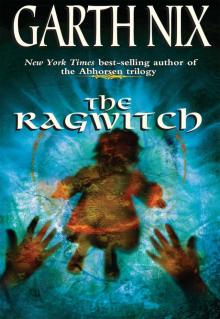 The Ragwitch
The Ragwitch Newt's Emerald
Newt's Emerald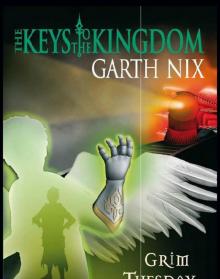 Grim Tuesday
Grim Tuesday Sabriel
Sabriel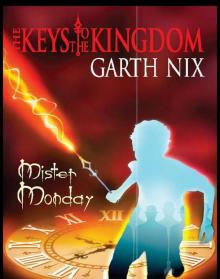 Mister Monday
Mister Monday The Missing
The Missing The Fall
The Fall A Confusion of Princes
A Confusion of Princes Troubletwisters
Troubletwisters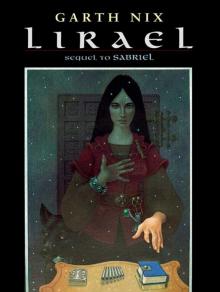 Lirael
Lirael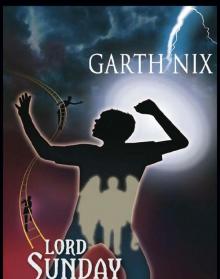 Lord Sunday
Lord Sunday Clariel
Clariel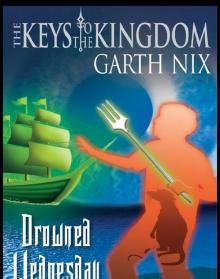 Drowned Wednesday
Drowned Wednesday Shade's Children
Shade's Children The Violet Keystone
The Violet Keystone Abhorsen
Abhorsen The Monster
The Monster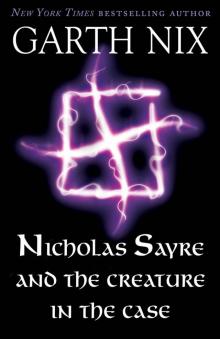 The Creature in the Case
The Creature in the Case To Hold the Bridge
To Hold the Bridge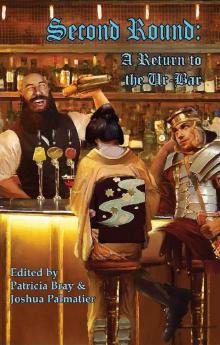 Second Round: A Return to the Ur-Bar
Second Round: A Return to the Ur-Bar Above the Veil
Above the Veil Aenir
Aenir Mystery of the Golden Card
Mystery of the Golden Card Superior Saturday
Superior Saturday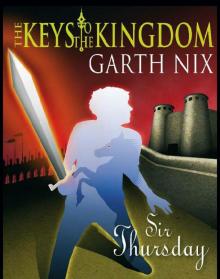 Sir Thursday
Sir Thursday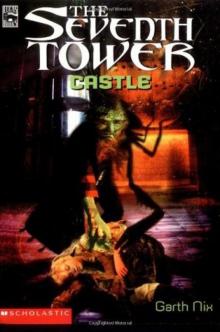 Castle
Castle Lady Friday
Lady Friday Into Battle
Into Battle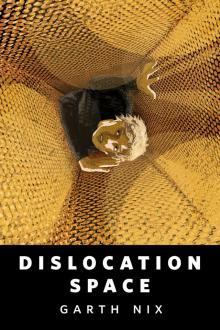 Dislocation Space
Dislocation Space Sabriel (Old Kingdom Book 1)
Sabriel (Old Kingdom Book 1) Sir Hereward and Mister Fitz Go to War Again shamf-1
Sir Hereward and Mister Fitz Go to War Again shamf-1 The Left-Handed Booksellers of London
The Left-Handed Booksellers of London Novel - A Confusion of Princes
Novel - A Confusion of Princes One Beastly Beast
One Beastly Beast A Suitable Present for a Sorcerous Puppet shamf-3
A Suitable Present for a Sorcerous Puppet shamf-3 Beyond the Sea Gates of the Scholar Pirates of Sarsköe shamf-2
Beyond the Sea Gates of the Scholar Pirates of Sarsköe shamf-2 Have Sword, Will Travel
Have Sword, Will Travel Fire Above, Fire Below
Fire Above, Fire Below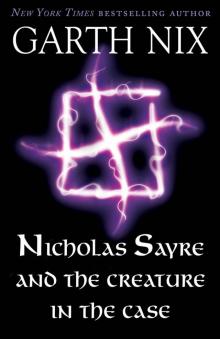 Nicholas Sayre and the Creature in the Case
Nicholas Sayre and the Creature in the Case The Monster (Troubletwisters)
The Monster (Troubletwisters) Across the Wall
Across the Wall Let Sleeping Dragons Lie
Let Sleeping Dragons Lie![[Abhorsen 03a] - Across the Wall Read online](http://i1.bookreadfree.com/i2/04/12/abhorsen_03a_-_across_the_wall_preview.jpg) [Abhorsen 03a] - Across the Wall
[Abhorsen 03a] - Across the Wall